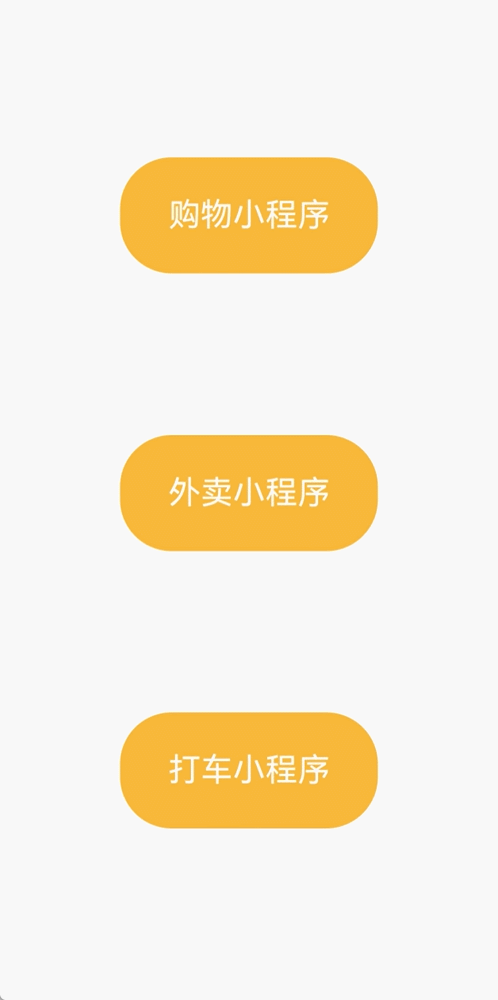HarmonyOS鸿蒙Next中ArkUI路由/导航系列:Navigation嵌套开发
HarmonyOS鸿蒙Next中ArkUI路由/导航系列:Navigation嵌套开发
1、Navigation嵌套开发简介
Navigation作为导航框架,支持嵌套使用。如下示例场景:
- 外层Navigation A通过栈操作push了一系列NavDestination,其中一个NavDestination内部又嵌套了一个Navigation B,并且该Navigation B也具有自己的NavPathStack,也可以在内部进行路由跳转。
通过上述逻辑可以将业务逻辑划分成不同的模块,应用主体逻辑模块只负责在不同的子业务之间进行路由,而各个子业务之间可以通过自己内部的Navigation,实现内部页面的路由。
下面通过实现一个应用集成不同小程序的demo来阐述Navigation嵌套场景的用法。
2、案例分享
2.1 主页逻辑模块
主页中有一个Navigation用于不同小程序模块之间的路由跳转
// src/main/ets/pages/Index.ets
@Component
struct HomePage {
private stack: NavPathStack | undefined = undefined;
build() {
NavDestination() {
Column() {
// 跳转到购物小程序
Stack({alignContent: Alignment.Center}) {
Text('购物小程序').fontSize(25).fontColor(Color.White)
}.onClick(() => {
this.stack?.pushPath({name: "shopping"})
}).width(200).height(90).borderRadius(40).backgroundColor('#fff3bb3f')
// 跳转到外卖小程序
Stack({alignContent: Alignment.Center}) {
Text('外卖小程序').fontSize(25).fontColor(Color.White)
}.onClick(() => {
this.stack?.pushPath({name: "takeout"})
}).width(200).height(90).borderRadius(40).backgroundColor('#fff3bb3f')
// 跳转到打车小程序
Stack({alignContent: Alignment.Center}) {
Text('打车小程序').fontSize(25).fontColor(Color.White)
}.onClick(() => {
this.stack?.pushPath({name: "taxi"})
}).width(200).height(90).borderRadius(40).backgroundColor('#fff3bb3f')
}.width('100%').height('100%').justifyContent(FlexAlign.SpaceEvenly)
}.width('100%').height('100%')
.onReady((ctx: NavDestinationContext) => {
this.stack = ctx?.pathStack;
})
}
}
@Builder
export function HomePageBuilder() {
HomePage()
}
@Entry
@Component
struct Index {
private stack: NavPathStack = new NavPathStack();
aboutToAppear(): void {
this.stack.pushPath({name: 'home'})
}
build() {
Navigation(this.stack) {}
.hideNavBar(true)
.mode(NavigationMode.Stack)
.height('100%')
.width('100%')
}
}
2.2 购物小程序模块
购物小程序页面内有一个嵌套的Navigation用于不同子页面之间的路由跳转
// src/main/ets/pages/Shopping.ets
import { InnerControl } from './Common';
@Component
struct ShoppingPage {
private stack: NavPathStack = new NavPathStack();
build() {
NavDestination() {
Column() {
// 在该NavDestination内部嵌套了一个Navigation,并且使用一个单独的导航控制器,用于购物小程序内部的路由
Navigation(this.stack) {
InnerControl().height('100%').width('100%')
}.height('100%').width('100%')
.backgroundColor('#fff8dbdb')
.mode(NavigationMode.Stack)
}.width('100%').height('100%')
}.width('100%').height('100%')
.title('购物').hideBackButton(true)
}
}
@Builder
export function ShoppingBuilder() {
ShoppingPage()
}
2.3 外卖小程序模块
外卖小程序页面内有一个嵌套的Navigation用于不同子页面之间的路由跳转
// src/main/ets/pages/Takeout.ets
import { InnerControl } from './Common';
@Component
struct Takeout {
private stack: NavPathStack = new NavPathStack();
build() {
NavDestination() {
Column() {
// 在该NavDestination内部嵌套了一个Navigation,并且使用一个单独的导航控制器,用于外卖小程序内部的路由
Navigation(this.stack) {
InnerControl().height('100%').width('100%')
}.height('100%').width('100%')
.backgroundColor('#ffe7f8db')
.mode(NavigationMode.Stack)
}.width('100%').height('100%')
}.width('100%').height('100%')
.title('外卖').hideBackButton(true)
}
}
@Builder
export function TakeoutBuilder() {
Takeout()
}
2.4 打车小程序模块
打车小程序页面内有一个嵌套的Navigation用于不同子页面之间的路由跳转
// src/main/ets/pages/Taxi.ets
import { InnerControl } from './Common';
@Component
struct Taxi {
private stack: NavPathStack = new NavPathStack();
build() {
NavDestination() {
Column() {
// 在该NavDestination内部嵌套了一个Navigation,并且使用一个单独的导航控制器,用于打车小程序内部的路由
Navigation(this.stack) {
InnerControl().height('100%').width('100%')
}.height('100%').width('100%')
.backgroundColor('#ffc3f9fc')
.mode(NavigationMode.Stack)
}.width('100%').height('100%')
}.width('100%').height('100%')
.title('打车').hideBackButton(true)
}
}
@Builder
export function TaxiBuilder() {
Taxi()
}
2.5 小程序内部页面模块
// src/main/ets/pages/Common.ets
@Component
export struct InnerControl {
private stack: NavPathStack | undefined = undefined;
aboutToAppear(): void {
let info = this.queryNavigationInfo();
this.stack = info?.pathStack;
}
build() {
Column() {
Button('内部业务A').onClick(() => {
this.stack?.pushPath({name: "detailA"})
}).width(150).height(60).borderRadius(20).backgroundColor('#fff3bb3f')
Button('内部业务A').onClick(() => {
this.stack?.pushPath({name: "detailB"})
}).width(150).height(60).borderRadius(20).backgroundColor('#fff3bb3f')
}.width('100%').height('100%').justifyContent(FlexAlign.SpaceEvenly)
}
}
@Component
export struct DetailA {
build() {
NavDestination() {
InnerControl().width('100%').height('100%')
}.width('100%').height('100%').backgroundColor('#fff6c5c5')
}
}
@Builder
export function DetailABuilder() {
DetailA()
}
@Component
export struct DetailB {
build() {
NavDestination() {
InnerControl().width('100%').height('100%')
}.width('100%').height('100%').backgroundColor('#ffddfaae')
}
}
@Builder
export function DetailBBuilder() {
DetailB()
}
上述demo效果如下图所示:

3、附件
上述案例完整示例代码如下: (代码链接待补充)
【系列其他文章】
- 【ArkUI路由/导航系列】一:ArkUI路由原理简介,认识Navigation组件
- 【ArkUI路由/导航系列】二:Navigation基础路由操作,让页面跳转起来
- 【ArkUI路由/导航系列】三:NavDestination标题栏和工具栏,丰富页面信息
- 【ArkUI路由/导航系列】四:Navigation页面信息查询
- 【ArkUI路由/导航系列】五:Navigation生命周期管理
- 【ArkUI路由/导航系列】六:Navigation组件的无感监听
- 【ArkUI路由/导航系列】七:Navigation自定义转场动画,让页面切换炫起来
- 【ArkUI路由/导航系列】八:Navigation跨包路由,迈入高级路由能力
- 【ArkUI路由/导航系列】九:Navigation分栏开发,开启多设备开发之旅
- 【ArkUI路由/导航系列】十:Navigation嵌套开发
- 【ArkUI路由/导航系列】十一:Navigation弹窗页面开发
- 【ArkUI路由/导航系列】十二:Navigation路由拦截
更多关于HarmonyOS鸿蒙Next中ArkUI路由/导航系列:Navigation嵌套开发的实战教程也可以访问 https://www.itying.com/category-93-b0.html
在HarmonyOS鸿蒙Next中,ArkUI的Navigation组件支持嵌套开发。Navigation作为容器组件,可多层嵌套实现复杂路由结构。父级Navigation管理全局路由栈,子级Navigation维护局部路由栈。通过router.pushUrl()或router.replaceUrl()方法切换页面时,需指定路由参数(如:url、params),系统会自动识别对应层级的Navigation进行跳转。嵌套时需注意路由层级匹配,避免冲突。页面生命周期由所属Navigation层级独立管理。
更多关于HarmonyOS鸿蒙Next中ArkUI路由/导航系列:Navigation嵌套开发的实战系列教程也可以访问 https://www.itying.com/category-93-b0.html
这是一个很好的HarmonyOS Next中关于Navigation嵌套开发的示例。我来分析下关键点:
-
嵌套Navigation的核心思路是:外层Navigation管理主模块跳转,内层Navigation管理子模块内部跳转。每个Navigation使用独立的NavPathStack实例。
-
代码中展示了典型的三层结构:
- 外层:Index页面的Navigation控制主页面和三个小程序模块的切换
- 中层:每个小程序模块(Shopping/Takeout/Taxi)内部又包含自己的Navigation
- 内层:小程序内部页面(DetailA/DetailB)的跳转
- 关键实现细节:
- 每个Navigation都需要独立的NavPathStack实例
- 通过NavDestinationContext获取当前Navigation的stack引用
- 内层Navigation可以有自己的转场动画和导航栏配置
- 这种架构的优势:
- 模块化清晰,各业务模块自治
- 导航栈隔离,避免路由冲突
- 适合复杂应用的分层管理
代码示例很完整,展示了从主页跳转到小程序模块,再在小程序内部跳转的完整流程。这种模式在实际开发中很实用,特别是对于平台型应用集成多个子业务的场景。






